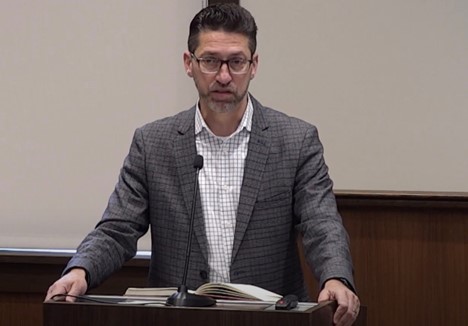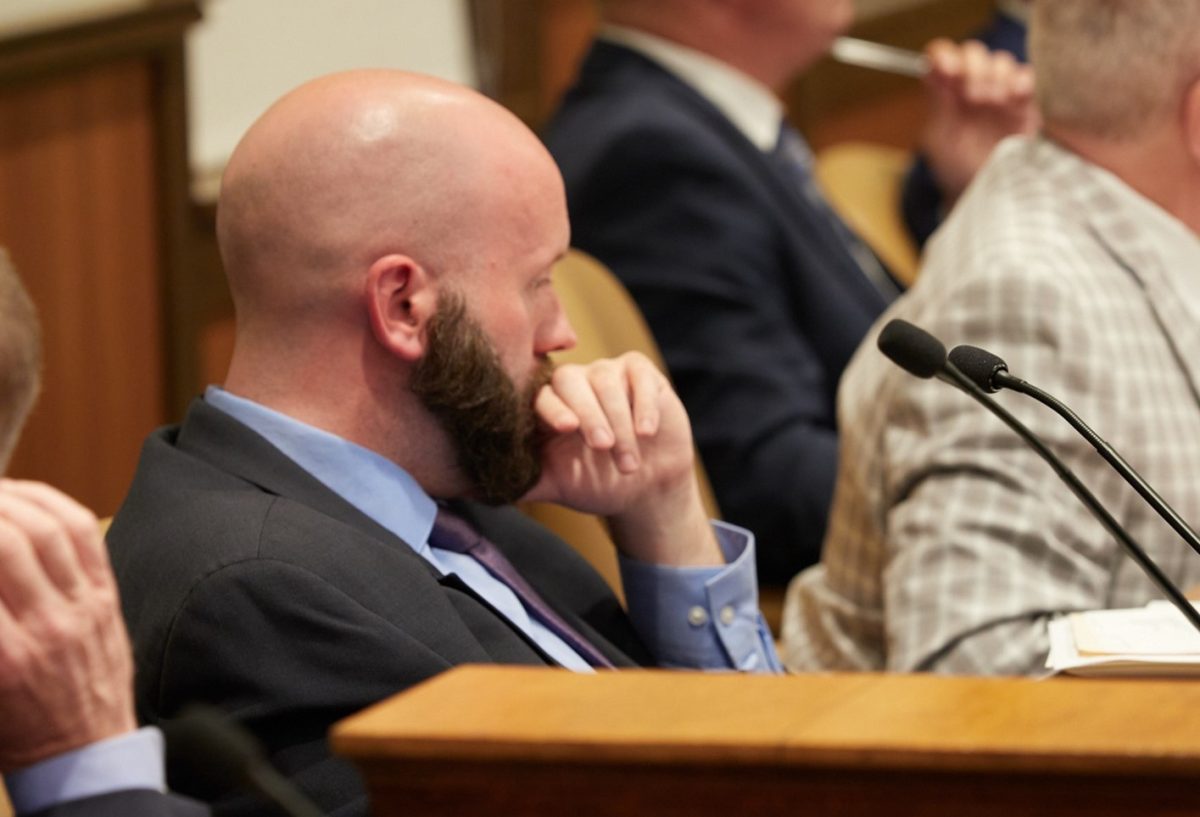Select Board member Kevin Canty says that a Plymouth Independent reporter committed a felony punishable by up to five years in prison for recording the board’s public meeting earlier this month without first announcing he was doing so – even though the session was being streamed live on YouTube.
The unusual public admonition took place during the Select Board’s June 11 meeting as it was interviewing candidates for the Community Preservation Committee. Canty, who said he was speaking at the behest of Town Manager Derek Brindisi, interrupted the proceedings to say Brindisi had informed him he was aware that “there may be one or more persons recording audio without having announced it.”
“There is a wiretapping statute that prohibits the discreet recording of even a public meeting by a private individual or member of the media that is punishable by up to five years in state prison, or two and a half years in jail,” Canty told the audience at Town Hall, as well as viewers watching online through PACTV, the local community access organization. “So if you are making any recording without making those in the room aware of that, I would encourage you to reconsider that particular stance.”
The warning appeared directed at reporter Fred Thys, who was sitting in the front row, near Canty and Brindisi. Thys immediately acknowledged that he was openly making an audio recording of the meeting, which he had done in the past without incident.
“I’m recording because it’s a lot easier than waiting for PACTV to provide its recording, which usually takes a couple of days,” Thys told Canty. “It’s also so much more accurate than taking notes.”
In an interview later, Brindisi said he didn’t ask Canty to bring up the possibility of jail time. But he did send Thys an email during the June 11 session that cited a passage from the Massachusetts Open Meeting Law, not the wiretapping statute. The email read, in part, “Any member of the public may make an audio or video recording of an open session of a public meeting. A member of the public who wishes to record a meeting must first notify the chair and must comply with reasonable requirements regarding audio or video equipment established by the chair so as not to interfere with the meeting. The chair is required to inform other attendees of any such recording at the beginning of the meeting.”
Thys said he did not see the email until after the meeting. The day following the incident, Thys said he was still puzzled by the actions of Canty and Brindisi.
“I was recording in plain sight. I had my arm extended holding my phone and was pointing it at the person speaking, whether at the podium or on the Select Board,” he said. “I was sitting in the front row in full view of the board and [Brindisi] the entire time I was recording, which is how the town manager saw that I was recording.”
In his decades of covering and recording public meetings, Thys said, “no official has ever told me that I had to announce that I was recording the meeting, nor has any other journalist also recording the meeting been told so.”
Nor have they been told by an elected official that they were committing a felony in the process, he added.
The Open Meeting Law does not mention any punishment for failure to comply with the announcement clause. Canty, however, cited a different state law which relates to the “interception of wire and oral communications” – and is often applied to organized criminal activities.
Justin Silverman, director of the New England First Amendment Coalition, said Canty’s remarks were disturbing.
“It’s troubling any time a member of government threatens jail time against a journalist when they’re just simply doing their job,” he said. Thys, Silverman said, was exercising his “First Amendment right to record public officials engaged in public duty in a public space.” That right, he said, has been reaffirmed by the U.S. Court of Appeals for the First Circuit in a 2011 case involving the recording of police officers on Boston Common.
On top of all of that, Silverman said, “you have a meeting that’s being live streamed and recorded. Certainly, there’s no expectation of privacy here. One really needs to question what the intent was to make that threat of jail time. Was it to intimidate the journalist?”
In an interview the day after the Select Board meeting, Canty stood firm.
Not announcing that a recording of a public meeting is being made can result in “a five-year felony charge,” he insisted, “and you don’t want to commit that for something silly when all you have to do is say, ‘Hey, I’m recording this,’ and then you’re covered… Felonies are very easy to commit. You steal someone’s phone [and] if it costs over $1,200, that can be a felony conviction. People have a misunderstanding of what a felony is, what it isn’t, but people listen when you say that’s what they’re doing…they take it seriously.”
Canty, who is a lawyer, said he has “no ill feelings towards” Thys or the Plymouth Independent. “It’s just my general practice as a rule as a criminal defense attorney to discourage people from committing felonies,” he said.
The fact that the meeting was being streamed live did not matter, he added. “A surreptitious recording is a violation, even if you’re in a room like that, that is having a separate recording of audio and visual by PACTV,” Canty said.
Silverman disagreed with Canty’s assertion.
“If you’re in a situation where the meeting is already being recorded by other parties and everyone’s aware of that, then I can’t think of any need that exists to then inform others that you are recording too,” he said. “There’s no expectation of privacy at these public meetings to begin with. But if there were – and I’m not saying that there is – a need to announce that the recording is happening anyway, that that need ceases to exist once other parties are recording. That notice has been given. Everyone understands that the recording is occurring.”

Asked whether he had previously interrupted a meeting to warn people that they might be breaking the law by recording it, Canty said, “I don’t recall. I’ve only been on the board for 13 months. I don’t recall an instance where someone was recording on their phone in a way that I was made aware of it, either directly or indirectly, but I would call someone out for it because it is a felony.”
He also could not remember an instance in which a reporter faced criminal charges for recording a public meeting without first announcing it.
Thys made “an innocent mistake,” Canty said, “but you know, at the end of the day, unfortunately, ignorance of the law is no defense.”
Thys said he made no effort to hide what he was doing and did not consider it a “mistake.”
Silverman said that aside from Canty’s invocation of the wiretapping law and the threat of jail time – which he believes has never been used against a reporter covering a public meeting – the Opening Meeting Law section related to announcing a recording is flimsy. “I’m not aware of anyone challenging it,” he said, “but I question how that could be enforced.”
It was that Open Meeting Law clause that Brindisi pasted into the email he sent Thys during the meeting.
“I walked over to Dickie [Quintal], the chair, and to Kevin [Canty] and said, ‘Hey, just so you know, we have somebody who’s recording in here.’” Brindisi said in an interview. “‘You may want to make an announcement that recordings have to be announced before the recording begins.’ So it was nothing other than that…You have to speak to Kevin about why he chose the words that he chose.”
Going forward, Brindisi said, the requirement to announce the intent to record a public meeting will be made explicit.
“Because of this, we actually plan on putting a statement on every future agenda that any recordings need to be stated publicly before the recordings begin,” he said.
The Select Board itself has run afoul of the Open Meeting Law. In April, it was reprimanded by state Attorney General Andrea Campbell for violating the law multiple times last year. Brindisi said at the time that the allegations were minor in nature, but that the town took the complaints “very seriously” and always strives to “make improvements.”
Mark Pothier can be reached at mark@plymouthindependent.org.

